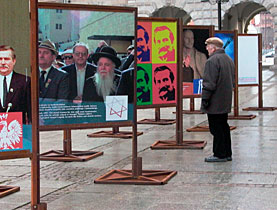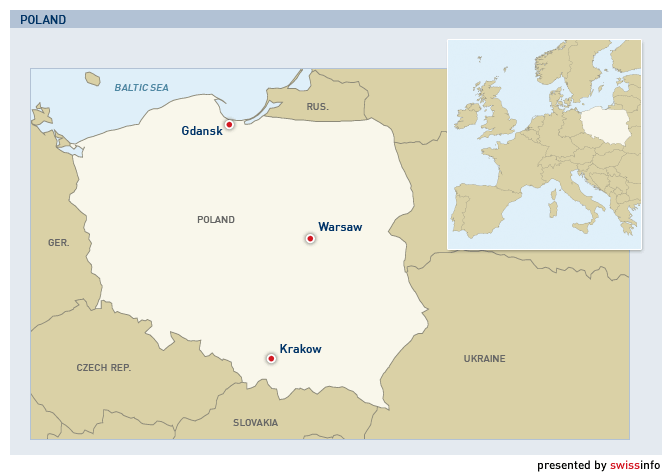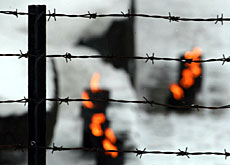Swiss look at history through Polish eyes

Switzerland is a country with 160 years of solid peace behind it. Poland's experience could hardly be more different, as two young Swiss recently saw for themselves.
Karin Enzler, a journalist with an interest in local leadership, and Christian Cantale, who has studied business management and is closely involved in the scout movement, joined about 200 other young people from a range of countries on the “Solidarity Express”.
Their journey took them from Cracow in the south, to Gdansk in the north, following recent Polish history from totalitarianism to the place where the Solidarity trade union was born. It ended with a conference which brought together Polish and foreign politicians and Nobel peace prize winners under the title “Solidarity for the Future”.
The occasion was the 25th anniversary of the awarding of the Nobel Peace Prize to Lech Walesa, the leader of Solidarity, which conducted a decade-long non-violent struggle against the communist regime in the 1980s.
Auschwitz
Near Cracow participants visited the Auschwitz-Birkenau Nazi concentration camp, where over a million people died during the Second World War – in the gas chambers, of disease, starvation or exhaustion.
Like many visitors to Auschwitz, Enzler was particularly moved by the displays of personal items taken from the victims – huge showcases piled high with spectacles, shoes, pots and pans and human hair.
“It was not just a human tragedy, but so well organised. It was awful,” she told swissinfo.
In Warsaw they visited the site of the Jewish ghetto and the Museum of the Warsaw Uprising, commemorating the events of 1944, in which the Polish resistance attempted to drive the occupying forces from the city.
Thousands of soldiers died on both sides, but the civilian population suffered the greatest casualties, and the city was practically destroyed by the Germans in reprisal.
The museum was opened on the Uprising’s 60th anniversary, the first time the terrible events could be properly commemorated. For it was not only the Nazis whose actions led to the destruction of the city: the advancing Soviet forces stopped just short of Warsaw and allowed the slaughter to continue. Under the Soviet-backed regime which came to power after the war, the truth could never be told.
“The trip was like a lesson in the history of Poland, where they fought two totalitarianisms within a few years, and how two extraordinary people, John Paul II and Lech Walesa, managed to build solidarity among the people,” said Enzler.
Moral values
The figures of the Polish pope and of Lech Walesa dominated the trip, which laid great stress on the moral force and shared values which underlay the victory against totalitarianism.
Cantale was interested in the value-based approach to history he found in Poland. “I really liked hearing a different point of view from the one you will find in Switzerland or in the rest of Europe,” he told swissinfo. In the west, faith and politics don’t mix, he said.
“It’s all very well to say that the economy can promote peace, but is that really enough? The idea that you need shared values to achieve real peace I found very interesting, and it’s a view you don’t often hear in our countries.”
Luigi Geninazzi, of the Milan-based Roman Catholic daily Avvenire, covered events in Poland in the 1980s. He told swissinfo that young Poles do not know much about the past and are more interested in money than in history – an attitude that is found in other countries too.
“This is a very good opportunity to reflect on history which has already become part of myth,” he said.
But perhaps the picture painted was too black and white?
“History always has more than one side,” Enzler commented. “We saw the side of people fighting against it [totalitarianism], but we didn’t see the side of people supporting it and that left a bit of a gap because one knows there must have been support somewhere.”
South African experience
One of the eminent guests invited to take part in the discussions and conference, Walesa’s fellow peace prize laureate Frederik de Klerk, the former president of South Africa, did address this issue in conversation with journalists.
He won the prize in 1993, jointly with Nelson Mandela, for his role in dismantling the apartheid system. He explained the way his political thinking had changed.
“I supported apartheid not because I thought it was right to suppress people, but because … my people, the Afrikaners, had a right to self-determination.” The idea was that each of the black nations would also be independent, leading to a kind of European Union in southern Africa.
“In the end I became convinced that our vision could not work, that we had failed to bring justice, that it was from a moral point of view indefensible and could not be repaired by improving it.”
He drew a contrast with the Polish situation: “In Poland there was a revolution which resulted in liberation. In South Africa those who were called suppressors initiated the liberation, which is a fundamental difference… And Solidarity never resorted to violent methods; the ANC did resort to violent methods.”
The question as to whether freedom can always be won by moral force alone was not addressed.
Does the Solidarity experience have any relevance today? Both Enzler and Cantale were impressed by the message of – solidarity.
“If there is something wrong in society and people stick together, they can bring about change; that’s something I’m going to take home with me,” said Enzler.
swissinfo, Julia Slater in Poland
Lech Walesa was born in 1943.
He worked as an electrician in the Lenin Shipyard in Gdansk.
He came to fame as the leader of a strike in the shipyard in 1980.
The Solidarity free trade union was established in the wake of the strike, with Walesa as its chairman.
Polish leader General Wojciech Jaruzelski declared martial law in December 1981.
Walesa was arrested and spent 11 months in prison.
In 1983 he was awarded the Nobel Peace Prize.
In 1988 the government agreed to re-establish Solidarity and organise “half-free” parliamentary elections.
Solidarity won almost all the seats for which it was allowed to stand in 1989; Walesa persuaded parties which had formerly been allied to the communists to form a non-communist coalition.
In 1990 Walesa was elected president of Poland, but his authoritarian style was widely criticised and he was not re-elected in 1995.
He stood again in 2000, but received only 1 per cent of the votes.
He left Solidarity in 2006 over political disagreements.
In 1995 he set up the Lech Walesa Institute, dedicated to accomplishing the goals he considers important, including safeguarding the Polish national heritage and consolidating democracy.


In compliance with the JTI standards
More: SWI swissinfo.ch certified by the Journalism Trust Initiative












You can find an overview of ongoing debates with our journalists here . Please join us!
If you want to start a conversation about a topic raised in this article or want to report factual errors, email us at english@swissinfo.ch.